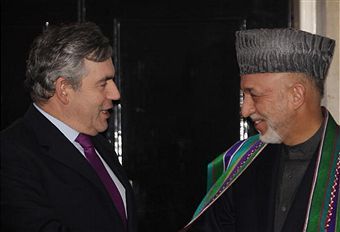 Whitehall has turned into the lobby of the UN General Assembly, as dignitaries gather to give NATO’s Afghan campaign renewed impetus. Will it all amount to much? It depends. In this piece for the magazine E!Sharp I set out my stall:
Whitehall has turned into the lobby of the UN General Assembly, as dignitaries gather to give NATO’s Afghan campaign renewed impetus. Will it all amount to much? It depends. In this piece for the magazine E!Sharp I set out my stall:
‘[if the conference] is to achieve anything more than fill out the evening news, the gathering must have only one aim: to help Hamid Karzai begin reaching out to insurgents and fence-sitters, drawing them into a negotiation that can drain the insurgency of all but the religiously-committed warriors.’
Part of this will involve giving money, jobs and security guarantees to foot-soldiers, as I recommended in a report back in 2008. But now this will probably not be enough.
Everyone hoped the shock therapy of invasion would help moderates entrench a new way of life in Afghanistan, which would be more democratic, more humane and less likely to harbour international terrorists. But after almost a decade, this internationally sponsored project must be called to a halt – it caannot be achieved, at least not within the next 50 years. The most likely scenario if matters continue, even after President Obama’s surge, is a precipitous withdrawal of international forces and the return of a revanchist Taliban and their al Qaeda backers.
Far better, therefore, to focus on making the country reasonably stable, even if this means that parts of it will be run in ways and by people who NATO has – until recently – fought. Far better to look at new ways of running the state, for example by decentralising power to a semi-autonomous southern region. Far better to cancel programmes that are culturally alien to Afghans and in so doing make it clear that the world does not wish to “westernise” the country, but make it stable.
A progressive, rights-respecting democracy is in the West’s interest – and should be a long-term goal. But a stable, quasi-democracy, which, like Saudi Arabia, practices the Sharia law, and like Iraq shares power with former combatants, is far better than an internationally created polity which by its nature provokes resistance and precipitates its own downfall.
It remains, unclear, however, whether the coalition has understood this and is willing to take the necessary steps.






Comments